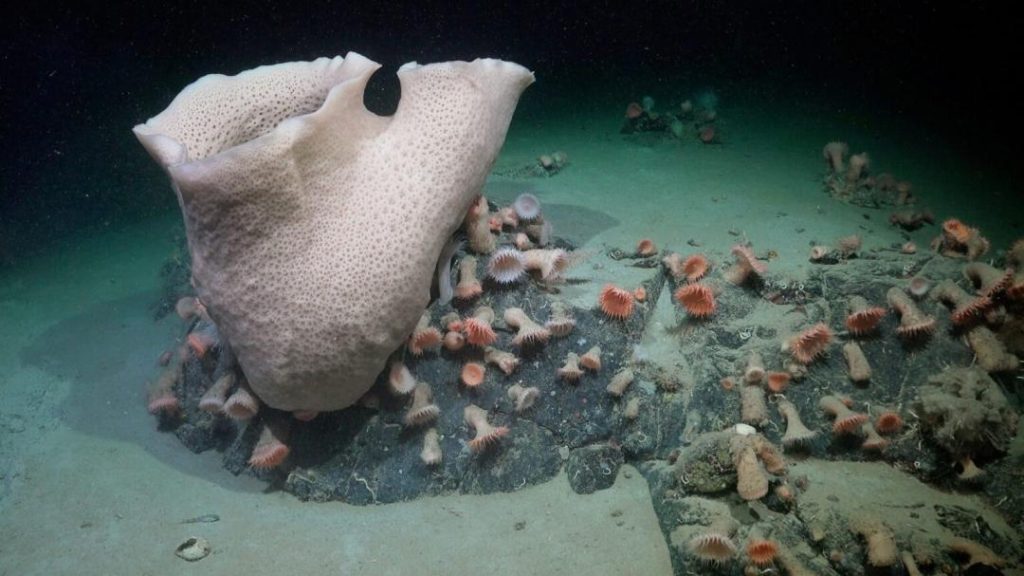
Unique Ecosystem Discovered After Iceberg Splits in Antarctica
In a groundbreaking discovery, scientists have uncovered a previously unknown ecosystem in Antarctica, hidden beneath an iceberg that recently broke off from the George VI Ice Shelf. The massive iceberg, roughly the size of Chicago, has been floating on the surface of the ocean for centuries, covering a unique and isolated ecosystem that has been cut off from surface nutrients for centuries.
The discovery is a significant finding in the field of marine biology, offering a rare glimpse into the unknown world that exists beneath the thick ice sheets that blanket much of Antarctica. The ecosystem, which includes sponges, anemones, hydroids, and coral, has been thriving in the dark, cold waters beneath the ice, defying expectations and challenging our current understanding of the Antarctic marine environment.
According to scientists, the ecosystem is unlike anything that has been seen before in Antarctica, with species that have evolved to survive in the harsh conditions beneath the ice. The discovery is a testament to the vast diversity of life on Earth and the incredible adaptation abilities of marine organisms.
The iceberg, which broke off from the George VI Ice Shelf, is a remarkable sight to behold. The shelf itself is a floating glacier that extends into the ocean, and the iceberg is one of the many fragments that break off from it. Measuring roughly 500 feet thick, the iceberg is a massive chunk of ice that has been floating on the surface of the ocean for centuries.
When the iceberg broke off, scientists were given a rare opportunity to study the unique ecosystem that exists beneath the ice. Led by a team of marine biologists from the British Antarctic Survey, the research team used remote-operated vehicles (ROVs) to explore the area and gather data on the ecosystem.
What they found was astonishing. The ecosystem is teeming with life, with species that have adapted to the extreme conditions beneath the ice. The sponges, anemones, hydroids, and coral that were discovered are unlike anything that has been seen before in Antarctica, with unique shapes and colors that have evolved to thrive in the dark, cold waters.
One of the most remarkable findings is the presence of coral, which is usually found in warm, tropical waters. The coral that was discovered in the Antarctic ecosystem is a type of deep-sea coral that is found in areas with limited sunlight, and it is thought to have evolved to survive in the harsh conditions beneath the ice.
The discovery of this unique ecosystem has significant implications for our understanding of the Antarctic marine environment. For centuries, ecosystems in Antarctica have been covered by almost 500 feet of ice, cutting them off from surface nutrients and making it difficult for scientists to study the area.
The discovery of this ecosystem offers a rare glimpse into the unknown world that exists beneath the ice, and it provides valuable insights into the diversity of life on Earth. The finding also highlights the importance of preserving and protecting the Antarctic environment, which is home to a unique and fragile ecosystem that is vulnerable to the impacts of climate change.
In conclusion, the discovery of this unique ecosystem beneath the iceberg in Antarctica is a remarkable finding that has significant implications for our understanding of the Antarctic marine environment. The discovery of sponges, anemones, hydroids, and coral in this extreme environment is a testament to the incredible adaptation abilities of marine organisms and the vast diversity of life on Earth.
As scientists continue to study this ecosystem, we can learn more about the incredible species that exist beneath the ice and the unique conditions that support life in this extreme environment. The discovery also highlights the importance of preserving and protecting the Antarctic environment, which is home to a unique and fragile ecosystem that is vulnerable to the impacts of climate change.
Source:
https://www.sciencealert.com/antarctic-iceberg-breaks-away-to-reveal-a-never-before-seen-ecosystem






